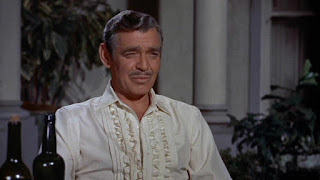 |
| Clark Gable and Yvonne De Carlo |
BAND OF ANGELS (1957). Director: Raoul Walsh.
In Kentucky in the 1880's, Amantha Starr (Yvonne De Carlo) discovers after her father's death that her mother was a slave, she is mulatto (although that term is never used), and she has lost everything, including her father's plantation, to his creditors. She is sold into slavery and acquired for $5000 by the wealthy Hamish Bond (Clark Gable), who treats his slaves with more kindness than others. But Rau-Ru (Sidney Poitier), whom Bond has raised like a son, feels that no amount of kindness can make up for his not being free. Rumblings from up North indicate that the so-called glory days of the South may just about be over.
 |
| Sidney Poitier and Carolle Drake |
Band of Angels is based on a novel by Robert Penn Warren (
All the King's Men), and it had to be much, much better than this film version, which is more along the lines of a Clark Gable Retread of
Gone With the Wind than anything else. The shame of it is that there is plenty of provocative material in here, but the picture is a morally ambiguous mish mash that throws scenes at the viewer without any great coherency or momentum. One wishes that many of the characters, especially the black characters, had been better developed.
 |
| Amantha sets herself apart from her people |
The treatment of racism is also comparatively trivialized and confused, to put it mildly. On the one hand, the film focuses on an interracial relationship (although both characters are played by white actors). On the other hand, Amantha spends most of the movie denying her heritage. Gable's character is also problematic, a slave trader who supposedly buys up slaves to keep them out of the hands of nastier owners out of guilt over his former actions. He mentions the real-life African King Gezo, who sold his own people, but this hardly excuses the actions of white slave traders. In Warren's book Bond comes to a much more satisfying end than he does in the movie.
Gable's performance is professional but comparatively passionless, while De Carlo is somewhat better. Notable in smaller roles are Andrea King as a supposed friend of Amamtha's, Rex Reason [
This Island Earth] as a minister-turned-soldier who falls for Amantha, and Torin Thatcher [
The 7th Voyage of Sinbad] as an old comrade of Bond's. Sidney Poitier gives the best performance in the film as the servant-son who becomes an understandably vengeful sergeant in the Union Army, and there is also good work from Carolle Drake as Michelle, another servant who seems to love Bond unconditionally. (Ms.) Tommie Moore plays another servant, Dolly, as if she thought she were appearing in an operetta! Robert Clarke and Ann Doran show up in bits and Patrick Knowles plays another plantation owner who nearly has a duel with Gable. Lucien Ballard's cinematography is first-rate, as usual, but Max Steiner's score can in no way be compared to his fine work on
Gone With the Wind and other films.
Verdict: Patronizing and contrived, with an interesting plot pretty much muffed. **.




4 comments:
Hi Bill— you’re right, this is far from a good film, but it is fascinating to watch Gable play with the young Sidney Poitier—you can tell that the two enjoyed working together. I think this is the only film in which Poitier played a slave...he obviously made a point of developing that groundbreaking leading man image that made him the first African American Oscar Winner for Best Actor. Would not have been for a hackneyed film like this.
- Chris
Yes, it's great that the talented Poitier went on to much, much better things. Gable and Poitier are interesting to watch together, their different approaches somehow meshing. I would have liked to have seen Gable hung, as he was in the novel, but you can't have everything, LOL!
There were some good performances in this film, especially from Poitier and Drake. Even Gable had one really good scene in which he was not phoning it in. It was interesting watching two Hollywood icons - one near the end of his career and the other during his first decade as a star - act together in scenes. But this movie could have been better. Mind you, the movie's first part, which featured Samantha Starr's journey from Kentucky to Louisiana, struck me as harrowing and first-rate. But once she reached New Orleans, the movie becomes a waste and I found its treatment on race and slavery very patronizing.
Very well put! The movie could have been so powerful and memorable, but Hollywood just wasn't ready to tackle the book's themes with veracity and intelligence. Still, as you noted, the film does have some positive aspects. Thank you for your interesting comments!
Post a Comment